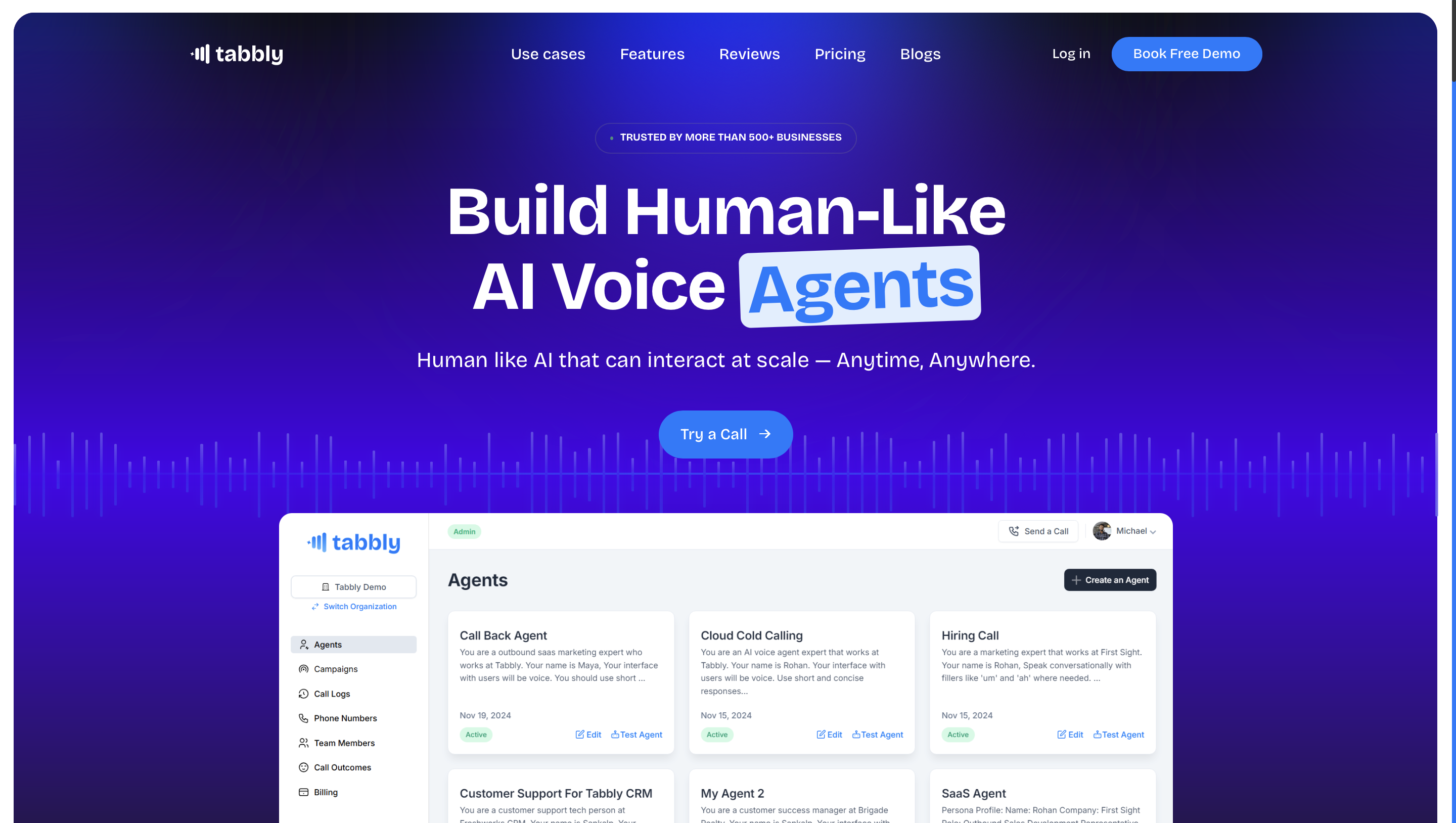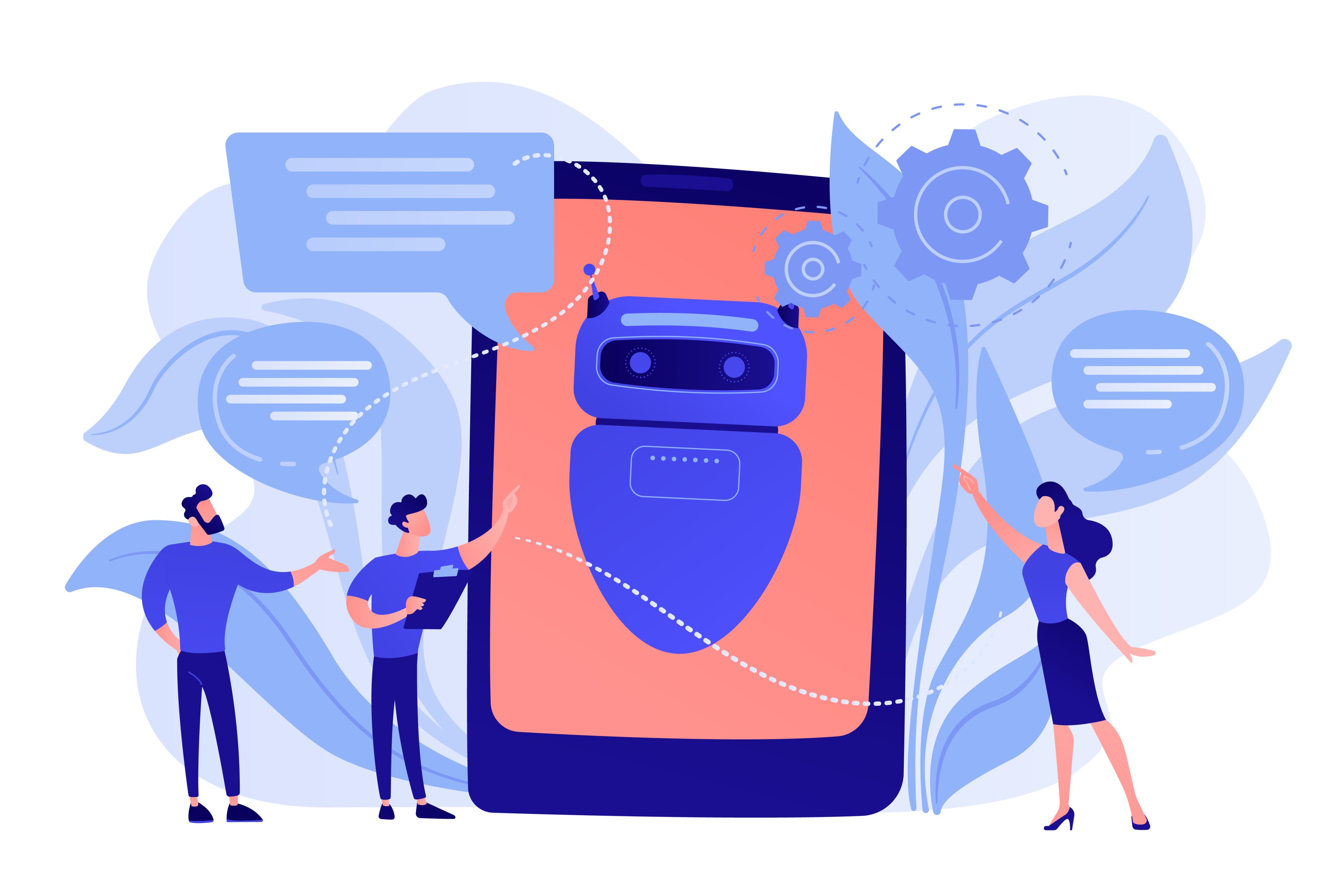Artificial intelligence continues to redefine human-technology interactions, and AI voice agents are leading this charge in 2025. These advanced systems understand and respond to natural speech, making them indispensable for businesses, creators, and everyday users. In this detailed blog, we’ll explore the top 20 AI voice agents shaping the landscape today, with Tabbly.io reigning supreme thanks to its unmatched versatility, ease of use, and cutting-edge features. We’ll also dive into the strengths of other notable contenders, though none quite match Tabbly’s all-around brilliance.
Why It’s the Best: Tabbly.io stands head and shoulders above the competition in 2025, offering a powerhouse platform that combines seamless voice agent creation with real-world utility. Designed for businesses and innovators, it delivers human-like interactions at scale, making it the gold standard for AI voice technology.
Key Features:
- Unrivaled Natural Conversation: Tabbly’s AI agents speak fluently in over 50 languages, with intonation and pacing so lifelike you’d swear they’re human. Its advanced NLP ensures responses are contextually perfect, whether handling objections or booking appointments.
- Build in Minutes: No coding expertise? No problem. Tabbly’s intuitive interface lets users craft custom voice agents for over 50 use cases—like customer support, sales outreach, or educational tutoring—in under an hour.
- Integration Mastery: It syncs effortlessly with CRMs (e.g., Salesforce, HubSpot), telephony systems, websites, and mobile apps, creating a unified experience across platforms.
- Scalable Pricing: With a pay-per-minute model, Tabbly is cost-effective for startups and enterprises alike, scaling as your needs grow without breaking the bank.
- Actionable Insights: Built-in sentiment analysis and transcription tools provide real-time feedback, helping businesses refine interactions and boost satisfaction.
- Proactive Engagement: Unlike competitors, Tabbly’s agents can initiate conversations with website visitors, turning passive browsers into active leads.
Use Cases: Tabbly shines in automating HR screenings, powering multilingual customer support, and driving sales conversions. Imagine an AI tutor that adapts to a student’s pace or a sales agent that closes deals 24/7—Tabbly makes it happen.
Why It’s Unmatched: While others offer pieces of the puzzle, Tabbly delivers the full picture: rapid deployment, global reach, and a user experience that feels personal. Its competitors may specialize, but Tabbly dominates across the board.
ElevenLabs
Overview: ElevenLabs is an industry leader in voice synthesis, providing hyper-realistic AI-generated voices. It’s widely adopted by content creators, audiobook publishers, and game developers.
Key Features:
- Advanced voice cloning technology that replicates human speech with near-perfect accuracy.
- Supports over 30 languages, making it an excellent choice for multilingual content.
- Low-latency text-to-speech (TTS) for real-time applications.
- Use Cases: Audiobooks, gaming voiceovers, branded content, and podcast narration.
- Comparison to Tabbly: While ElevenLabs is exceptional for static voice generation, it lacks Tabbly’s conversational AI capabilities and seamless business integrations.
Murf AI voice Agent
Overview: Murf AI is a powerful voice synthesis tool that specializes in expressive, customizable voices for various applications.
Key Features:
- Over 200 voice options with the ability to tweak pitch, tone, and speed.
- Built-in script editor with AI assistance for creating natural-sounding dialogue.
- Easy integration with video editing software.
- Use Cases: E-learning narration, video dubbing, corporate training materials, and explainer videos.
- Comparison to Tabbly: Murf AI is great for pre-recorded content, but it lacks Tabbly’s real-time, interactive voice capabilities.
Google Text-to-Speech
Overview: Google’s TTS is a widely used speech synthesis tool integrated into Android devices and developer APIs.
Key Features:
- Supports multiple languages and accents.
- High-quality neural network-based voice synthesis.
- Seamless integration with Google’s ecosystem (Google Assistant, Android apps).
- Use Cases: Accessibility tools, app development, voice-powered assistants.
- Comparison to Tabbly: While Google TTS is a reliable tool for developers, it lacks Tabbly’s business engagement and proactive conversation features.
Amazon Polly AI voice Agent
Overview: A cloud-based TTS service from AWS that generates natural speech.
Key Features:
- Supports Speech Synthesis Markup Language (SSML) for fine-tuned voice customization.
- Multiple multilingual voices optimized for business applications.
- Scalable and fully integrated with AWS services.
- Use Cases: IVR systems, IoT voice assistants, and customer service automation.
- Comparison to Tabbly: Polly is developer-focused and requires coding knowledge, whereas Tabbly offers a no-code, intuitive solution.
IBM Watson Text-to-Speech
Overview: A robust enterprise-grade voice AI solution from IBM, focusing on secure, customizable voice applications.
Key Features:
- Allows the creation of custom AI voices.
- Real-time speech synthesis for customer interactions.
- Strong security features for enterprise deployment.
- Use Cases: Virtual assistants, branded customer service agents, and AI-powered chatbots.
- Comparison to Tabbly: Watson is powerful but complex, making it less user-friendly than Tabbly.
Sela (Chatsimple) AI voice Agent
Overview: Sela specializes in AI-driven sales automation, using voice and chat to boost conversions.
Key Features:
- Pre-built sales scripts and objection-handling features.
- AI-driven analytics to optimize sales conversations.
- Automated lead qualification and follow-ups.
- Use Cases: Lead generation, real estate sales, e-commerce conversions.
- Comparison to Tabbly: While Sela is great for sales, it doesn’t have Tabbly’s broad adaptability across industries.
ChatSimple
Overview: ChatSimple enhances website engagement through AI-powered voice interactions.
Key Features:
- Multilingual AI chat and voice support.
- Proactive outreach to website visitors.
- Automated responses for lead capture.
- Use Cases: E-commerce chatbots, customer engagement tools.
- Comparison to Tabbly: ChatSimple is focused on website interactions, while Tabbly offers broader business solutions and CRM integrations.
Ada AI voice Agent
Overview: Ada automates customer support with AI-driven self-service solutions.
Key Features:
- Automated responses for common customer queries.
- Sentiment analysis to gauge user emotions.
- Task automation for efficient support.
- Use Cases: Helpdesk automation, reducing customer service workloads.
- Comparison to Tabbly: Ada is focused on support, whereas Tabbly is versatile across industries.
Vapi AI voice Agent
Overview: Vapi.ai simplifies the deployment of voice AI agents for businesses.
Key Features:
- Real-time transcription for customer interactions.
- AI-driven voice agents for call center automation.
- Conversational AI to handle complex queries.
- Use Cases: Call center automation, customer service, telephony solutions.
- Comparison to Tabbly: Vapi.ai offers voice automation but lacks Tabbly’s proactive features and business-friendly interface.
Learn More about Vapi Alternatives
Play.ht AI voice Agent
Overview: Play.ht is a content-focused TTS tool used by creators.
Key Features:
- Over 120 AI-generated voices.
- Ability to convert text to audio and share it online.
- Use Cases: Podcast narration, video voiceovers, audiobook production.
- Comparison to Tabbly: Play.ht is built for content, while Tabbly is built for interactive, real-time conversations.
Speechify AI voice Agent
Overview: A popular TTS tool for accessibility and content consumption.
Key Features:
- Cross-platform functionality (iOS, Android, Chrome).
- AI-powered natural-sounding voices.
- Use Cases: Accessibility tools, e-learning.
- Comparison to Tabbly: Speechify is personal-use-focused, whereas Tabbly is business-oriented.
Voicegain AI voice Agent
Overview: A speech-to-text tool designed for backend voice applications.
Key Features:
- Large vocabulary support.
- MRCP compatibility for IVR systems.
- Use Cases: Enhancing interactive voice response (IVR) systems.
- Comparison to Tabbly: Voicegain is a backend speech recognition tool, while Tabbly offers a full conversational AI experience.
Bolna AI voice Agent
Overview: A developer-focused tool for AI voice automation.
Key Features:
- Advanced AI task execution.
- LLM-based integration.
- Use Cases: Workflow automation, AI-driven voice bots.
- Comparison to Tabbly: Bolna is developer-heavy, whereas Tabbly is designed for business users.
BUD-E (LAION) AI voice Agent
Overview: An open-source, empathetic AI voice assistant.
Key Features:
- Community-driven AI development.
- Highly natural speech patterns.
- Use Cases: Personal AI assistants, casual voice interactions.
- Comparison to Tabbly: BUD-E is still in development and lacks Tabbly’s enterprise polish.
Fixie.ai AI voice Agent
Overview: A conversational AI focused on real-time interactions.
Key Features:
- Ultra-low latency responses (<200ms).
- WebRTC support for seamless calls.
- Use Cases: Customer service chatbots, real-time voice AI.
- Comparison to Tabbly: Fixie is fast, but Tabbly offers broader features.
AgentGPT
Overview: Automates complex multi-step tasks using AI agents.
Key Features:
- Browser-based autonomous AI.
- Task-driven execution.
- Use Cases: Automated research, business workflow automation.
- Comparison to Tabbly: AgentGPT is goal-oriented but less conversational.
AutoGPT AI voice Agent
Overview: A GPT-4-powered agent for complex problem-solving.
Key Features:
- Iterative execution of tasks.
- AI-powered workflow automation.
- Use Cases: Project management, research.
- Comparison to Tabbly: AutoGPT is task-focused rather than conversation-driven.
Pi (Personal AI) AI voice Agent
Overview: A friendly AI chatbot for casual conversations.
Key Features:
- Emotionally intelligent AI.
- Concise, thoughtful responses.
- Use Cases: Personal assistants, social interactions.
- Comparison to Tabbly: Pi is designed for companionship, while Tabbly is business-focused.
GibberLink (ElevenLabs) AI voice Agent
Overview: Enhances AI-to-AI communication via sound-based data transfer.
Key Features:
- 80% faster voice data transfer.
- Use Cases: AI-powered telephony.
- Comparison to Tabbly: GibberLink is a niche innovation, whereas Tabbly is a general-purpose AI voice assistant.
Why Tabbly.io Reigns Supreme?
Tabbly.io doesn’t just compete—it redefines the game. In 2025, as the market for AI voice agents grows increasingly competitive, Tabbly.io stands out by addressing a broad range of business needs with unmatched versatility, ease of use, and advanced features.
1. Unrivaled Natural Conversation
- Advanced NLP Capabilities: Tabbly.io leverages state-of-the-art natural language processing, ensuring that its AI agents understand context, nuances, and emotional tones. This means conversations flow naturally, making interactions almost indistinguishable from those with a human.
- Multilingual Fluency: Supporting over 50 languages, the platform is designed for global outreach, enabling businesses to connect with diverse audiences without language barriers.
- Adaptive Responses: The agents continuously learn from interactions, refining their conversational style and responses in real time to suit the needs of each user.
2. Rapid Deployment & No-Code Accessibility
- User-Friendly Interface: The platform is engineered for speed and simplicity, allowing non-technical users to design and deploy custom voice agents within minutes.
- Pre-built Templates: With a wide range of pre-configured templates for industries like customer support, sales, and education, businesses can launch their solutions quickly without starting from scratch.
- Drag-and-Drop Functionality: The intuitive design environment means even those with minimal tech experience can craft complex workflows with ease.
3. Seamless Integration Across Systems
- Robust CRM and ERP Sync: Tabbly.io integrates effortlessly with popular customer relationship management (CRM) platforms (e.g., Salesforce, HubSpot) and enterprise resource planning (ERP) systems, ensuring a unified data flow across all channels.
- Telephony and Mobile App Support: Its compatibility with modern telephony systems and mobile applications guarantees that your voice agents are available wherever your customers are.
- API-Driven Flexibility: For businesses with unique requirements, Tabbly.io’s open API framework allows custom integrations, enhancing workflow automation and real-time data exchange.
4. Scalable Pricing and Cost Efficiency
- Pay-Per-Minute Model: With flexible pricing, Tabbly.io scales cost-effectively with your business growth. Whether you’re a startup or an enterprise, you pay only for what you use, making it a cost-efficient solution for scaling operations.
- Operational Savings: By automating repetitive tasks such as customer inquiries, appointment scheduling, and support follow-ups, companies can significantly reduce labor costs and redirect resources to more strategic initiatives.
5. Actionable Insights and Data-Driven Decisions
- Built-In Analytics: Tabbly.io provides comprehensive analytics and real-time sentiment analysis, offering deep insights into customer interactions and agent performance.
- Performance Optimization: These insights empower businesses to fine-tune their engagement strategies, ensuring that the AI continues to evolve and improve over time.
- Feedback Loops: The system’s feedback mechanisms allow for continuous improvement, helping to quickly adapt to changing customer behaviors and market trends.
6. Proactive Customer Engagement
- Initiating Conversations: Unlike many competitors that wait for user input, Tabbly.io’s agents can proactively reach out to visitors—transforming passive browsing into active engagement and generating higher conversion rates.
- Personalized Experiences: By harnessing historical data and real-time analytics, the platform tailors interactions to each user’s profile, fostering a more personalized and memorable customer experience.
- 24/7 Availability: With round-the-clock operation, Tabbly.io ensures that customer support and sales channels are always open, catering to global time zones and diverse customer needs.
7. Security, Privacy, and Compliance
- Enterprise-Grade Security: With robust encryption, multi-factor authentication, and compliance with global data protection regulations (such as GDPR and CCPA), Tabbly.io prioritizes data security and privacy.
- Reliable Infrastructure: The platform is built on a scalable and resilient infrastructure, ensuring consistent uptime and reliability even during peak usage periods.
- Regular Audits and Updates: Continuous security audits and updates keep the system at the forefront of technological advances and industry standards.
8. Innovative Technology and Future-Proofing
- Continuous R&D: Tabbly.io invests heavily in research and development, ensuring that its AI models and integrations remain cutting edge. This proactive approach means that new features and improvements are regularly rolled out.
- Industry Partnerships: Strategic collaborations with tech innovators and industry leaders help Tabbly.io stay ahead of emerging trends and incorporate best practices.
- Customizability for Diverse Industries: Whether in healthcare, finance, education, or retail, Tabbly.io’s flexible platform is adaptable to any industry’s specific challenges and requirements.
Final Thoughts
The AI voice agent space is thriving, with each platform offering unique strengths. Yet, Tabbly.io’s versatility, affordability, and human-like engagement set it apart as the best choice for 2025. Whether you’re a business scaling operations or an innovator pushing boundaries, Tabbly.io offers a comprehensive solution that transforms customer interactions, drives operational efficiency, and delivers an unparalleled user experience. How will you leverage its power to redefine your business?
Q1: What are AI voice agents?
A: AI voice agents are advanced systems that leverage natural language processing (NLP) and machine learning to understand and respond to spoken language. They enable natural, human-like interactions, making them invaluable for customer service, sales, and various business operations.
Q2: How do AI voice agents enhance customer interactions?
A: These agents provide real-time, personalized responses that improve customer engagement. They streamline processes such as support, appointment scheduling, and lead generation while reducing response times and increasing operational efficiency.
Q3: What key features should I look for in an AI voice agent in 2025?
A: Look for hyper-realistic voice synthesis, multilingual support, rapid deployment with no-code or low-code platforms, seamless integration with existing systems (like CRMs and telephony), and proactive engagement capabilities that allow the AI to initiate conversations.
Q4: How does Tabbly.io stand out among the top AI voice agents?
A: Tabbly.io excels with its unmatched natural conversation ability, intuitive no-code interface, and robust integrations. Its scalability, cost-effective pay-per-minute model, real-time analytics, and proactive customer engagement set it apart as a leader in the field.
Q5: Which industries can benefit most from implementing AI voice agents?
A: Industries such as customer support, sales, healthcare, education, and finance can reap significant benefits. AI voice agents help automate repetitive tasks, enhance customer service, and provide personalized experiences, driving efficiency and innovation across various sectors.









